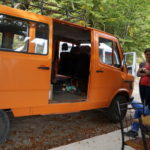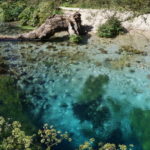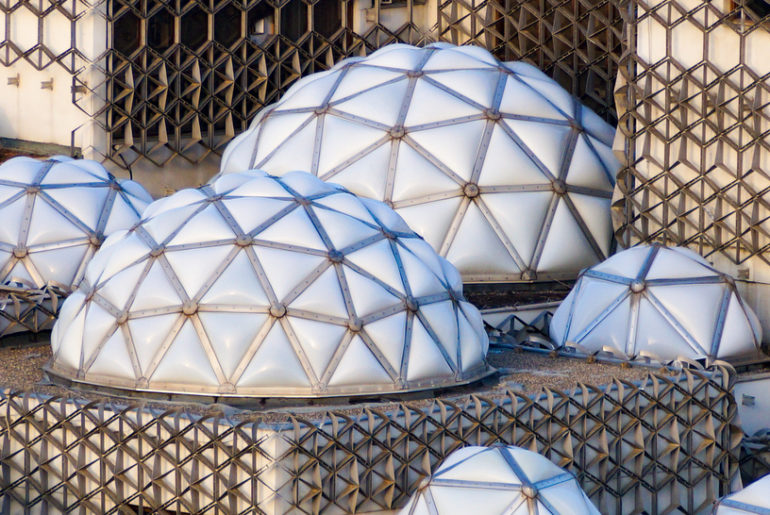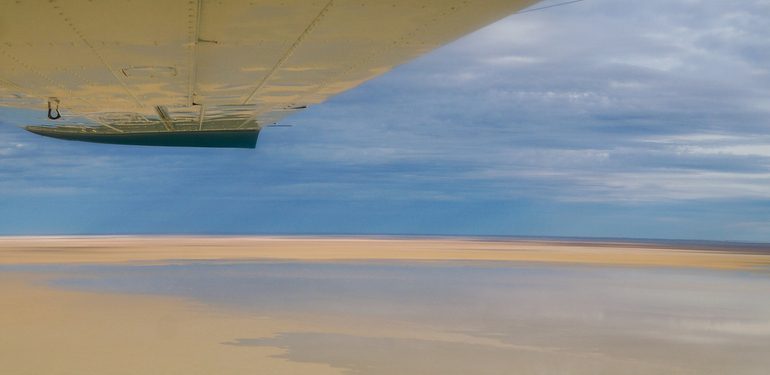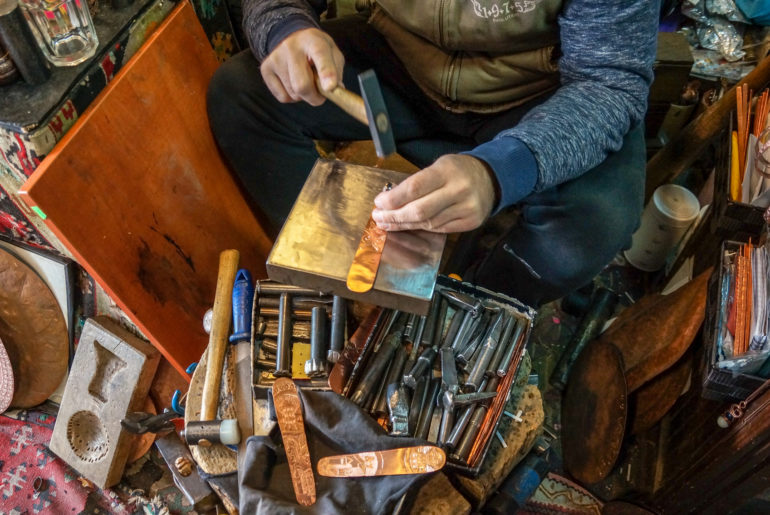There are 17 families living in Theth.
This is what Pjeter tells me when I ask about the village.
The fact that he does not just tell me the number of people says a lot about this place.
It’s a community.
But not the community it once was.
Two decades ago there were 250 families living here, until many traded life in the mountains for the opportunities in the cities like Shkodra, 70km away.
But now this village nestled in the Albanian Alps is experiencing a resurgence. This year, up to 10,000 people will visit Theth. During the season (June, July, August) every guesthouse here was full almost every night. To look around the smattering of houses, you have to wonder where they put 400 nightly guests.
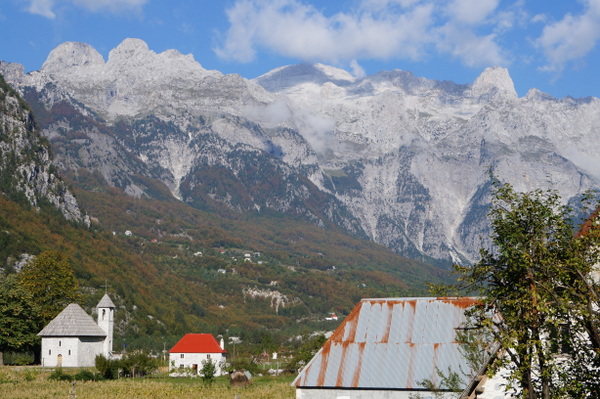
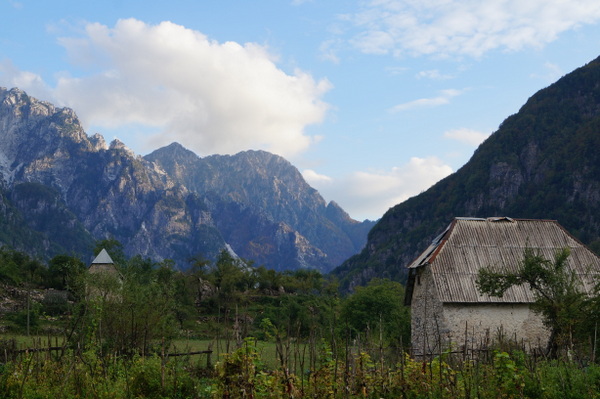
So why are people coming here?
My first experience of Albania was Shkodra, the country’s second largest city. It is a dump. Its people are living in landfill. The image of wild pigs dining on several truckloads of rubbish tipped into a gully unfortunately defines the city for me. Then there is the driving, which at best can be described as erratic, at worst, suicidal. The roads are the setting for a non-stop game of chicken and I haven’t seen such mayhem since Saigon, which is a city of 7.5 million. Shkodra doesn’t even have 100,000 people. It’s both fascinating and disturbing.
When I get out of the van after an entertaining ride from Shkodra I immediately feel what draws people here. The valley is calm. There’s a man sitting on a rock and sketching the church and Pjeter, the owner of the guesthouse I’m staying at, walks down the road to greet us. They are the only people I see until Vitoria, Pjeter’s wife, comes out of the house. It’s so quiet. It isn’t as if time has stood still, it’s as if time, along with the rest of the world, doesn’t exist.
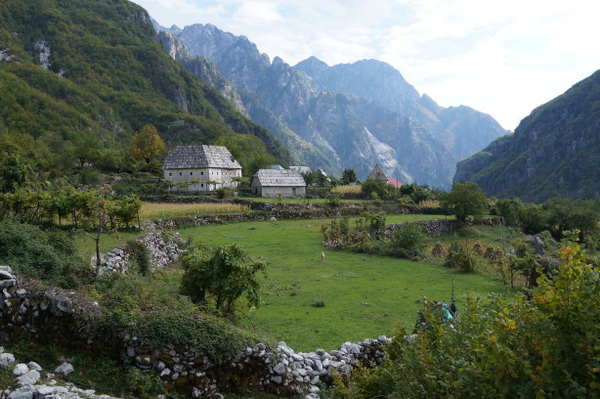
Theth is in the heart of the Theth National Park surrounded by Albania’s highest mountains, more than 100 caves and beautiful waterfalls. Compared to similar parts of Europe, the Albanian Alps are relatively unexplored by a lot of tourists. Even 10,000 visitors a year is not that many. People come here to access the mountains, but also for a glimpse at a different way of life.
During the day the valley is so quiet. Sometimes the only sound was a bell tied to cow several hundred metres away. At night the sky was full of stars.
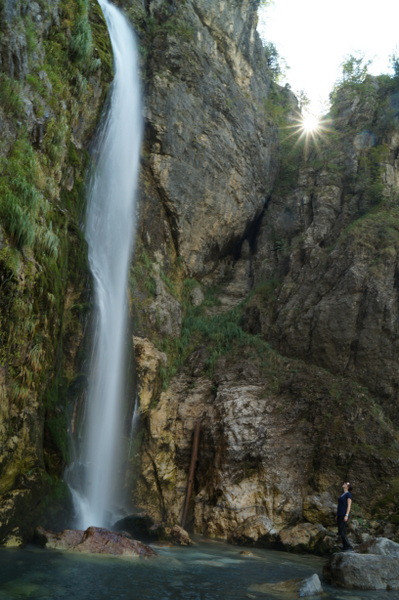
Theth
Theth was apparently founded 400 years ago by six brothers. The oldest grave I find in the cemetery is from 1933, but there are a lot of wooden crosses with just names, no dates. The main road in, a poor gravel track over the mountain, is inaccessible without a four-wheel-drive. In winter it is closed, but by then most of the residents will be in Shkodra. Only five families will brave the winter when the valley will be covered with about three metres of snow. The rest will come back in April or May.
Most of the buildings are houses or guesthouses, some of which also offer a cafe or bar. There is a school, but no stores. Supplies are brought in from Shkodra, but the families here are very self-sufficient. Every house has a vegetable garden, fruit trees and usually a cow or some sheep.
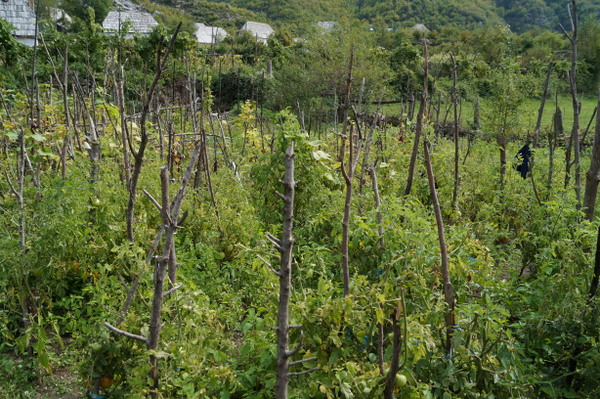
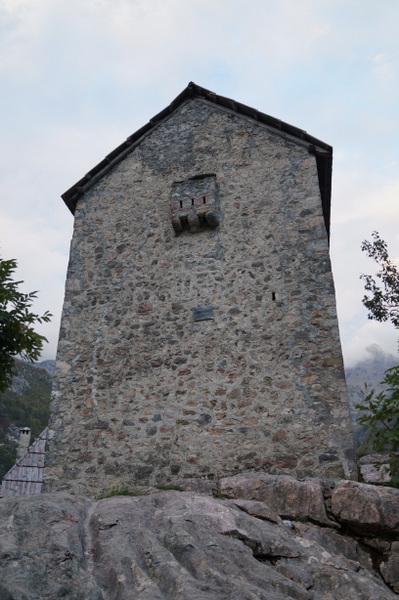
By its very location Theth has been protected by some of the troubles that have afflicted the rest of the country, although the tower by the river, which was used as a haven for men involved in blood feuds, is evidence the town didn’t quite escape every Albanian tradition. But more recently the community has had more freedom to take steps to improve the area.
After being appalled by Shkodra’s “rubbish problem” I was surprised by how clean Theth was. John, another guesthouse owner who gave me a lift back to the city, told me the school had initiated a program where the rubbish in the valley is collected and taken to Shkodra for disposal. There is a designated landfill in Shkodra, but because people have to pay to take their rubbish there, no one uses it and instead set fire to the loads they dump along the road. It’s a mentality that John said was hard to change. Foreign tourists to Theth are respectful of the landscape, but Albanian visitors continue to dump rubbish in the valley.
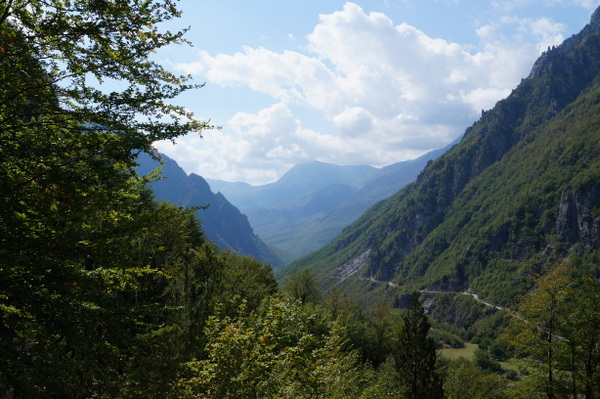
John is also involved in an English language program at the school, where children and adults take intensive courses during the summer. The children I met in Theth spoke much better English than children I’ve met anywhere else in Albania or the Balkans. Sam, the American girl I was travelling with for a few days, and I talked to some children who were marking out a hopscotch grid with stones. A little girl pointed at Sam’s bracelet. “For me?” Sam wasn’t too attached to it so handed it over. I wasn’t as generous with my $400 prescription sunglasses the kids took off me and tried on. I got a bit nervous when they passed them to the boy who can’t have been much older than two and was always holding his sister’s hand as they walked through the village.
But Theth is progressing in some areas, it still has its problems. The government has no interest in improving the road to the valley, despite the number of tourists Theth is attracting. There is also little marketing for the area. Most visitors have their stay arranged by hotels and guesthouses in Shkodra. Apparently the tourist organisations frequently give out wrong information.
The people
When Pjeter first tells me there are 17 families in Theth I thought it was a charming way of describing the population. But I soon realised it said so much about the people and sense of community. When I walked around the village a lot of children and adults stopped to talk to me. When I’d describe where I was staying, they’d reply “Pjeter and Vitoria”. Pjeter has lived in Theth all his life, apart from a year or so when he lived in Shkodra and worked for the police in the mid-90s. They raised their children here. Given the population and isolation, it’s not at all surprising that everyone knows everyone.
Pjeter and Vitoria have three children (or bambinos to use the Italian word we all understood), but none live in Theth. They have one daughter in New York, a son in Tirana and another son in Shkodra, who came to visit during my stay. But when a young girl walked through their yard while I was drinking coffee in the garden, I assumed I misunderstood my conversation with Pjeter about their children. (Pjeter’s English is limited so that’s likely.) A few hours later I saw her walk through the garden again, this time with some other children.
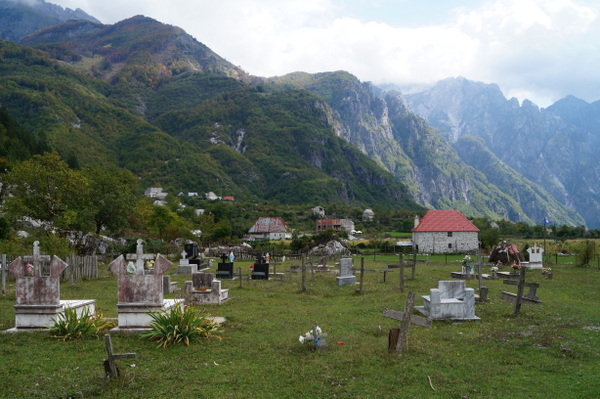
When I came back from a walk along the river behind the village, an old woman guided me back to Pjeter and Vitoria’s via a maze of paths linking all the houses. The paths went through people’s gardens and over fences and explained the stream of people walking by me when I sat outside.
At night there were usually a few people in the bar; although I never could work out if the people drinking at Pjeter and Vitoria’s were customers or just friends stopping in to say hello. I never saw money change hands.
Rural tourism
Pjeter and Vitoria have been hosting visitors in their home for years and opened the separate guesthouse in 2011. Downstairs, the floor of the triangular-roofed building is concrete. There is a small kitchen at one end that I never see the inside of. The other end has a bar with drinks and snacks behind it, a few tables and an iron where Vitoria smoothes out the croqueted table decorations she works on during the day while the men drink rakia and coffee. There is small bathroom at the back. The toilet has no seat (not uncommon in Albania) and is flushed by throwing buckets of water in the bowl.
Upstairs Sam and I are in one of the two bedrooms. Ours is crammed with three single beds and lots of thick blankets. The other room has a double bed. An extension has been marked out on the ground next to the guesthouse. Pjeter plans to build two more bedrooms and install a shower before the start of next year. So far each year has been busier than the last and it’s a trend I expect will continue.
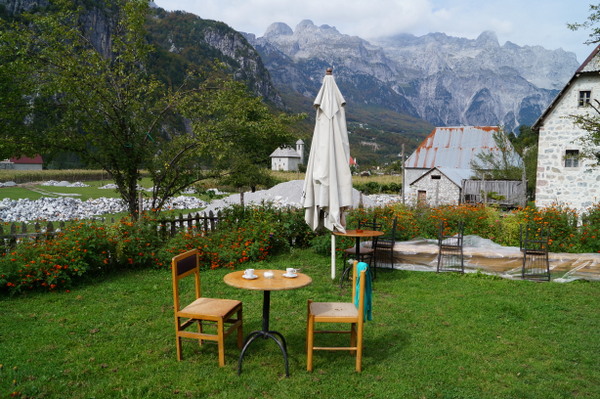
Nearly every family here offers accommodation in their home or runs a separate guesthouse. Pjeter and Vitoria also run a cafe and bar from the downstairs room. There were people drinking rakia outside early in the day. “Albanian breakfast is coffee and rakia,” another guesthouse owner told me. There are no restaurants so the guesthouses offer full board. I’m pleased when breakfast turns out to be a lot more substantial than coffee and liquor.
Most of the food we eat comes from Pjeter and Vitoria’s garden. On my first day I saw Vitoria picking salad items from the garden only about 20 minutes before serving them to us. During dinner on our first night, Pjeter pointed to our meal of roast lamb, salad, potatoes and cheese and says “from Theth”.
Pjeter’s English is poor, but we manage length conversations with the help of charades and dates and ages written down in my notebook. Vitoria only knows a few phrases, but again it’s not a problem during our stay.
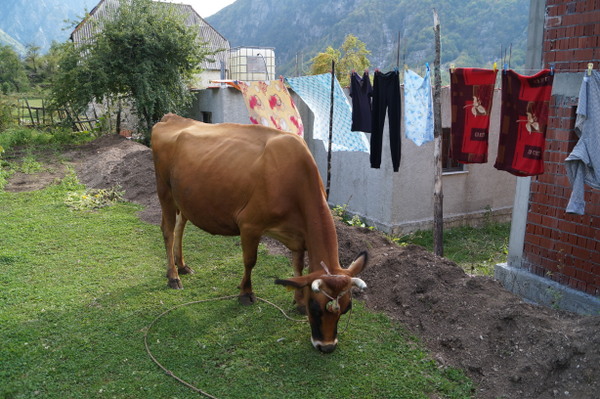
Sam and I spent our time walking along the trails along the river, reading and observing life in Theth. There was always something to watch: Vitoria croqueting, Pjeter walking their cow from the paddock to graze in the garden several times a day, people dropping by for coffee or rakia, children running through the yard.
If you go
My stay at Pjeter and Vitoria’s guesthouse was organised by Florian at Florian’s Guesthouse in Shkodra. I’ve heard that many hotels and guesthouses in Shkodra can organise transport and accommodation in Theth, but I can only personally recommend staying with Florian and asking him to help you. Florian started sending to guests to Pjeter and Vitoria after some of his guests came back and spoke highly of their stay in Theth. Before then, he did not know them personally.
The cost was €20 per night, with breakfast, lunch and dinner included. Neither Sam or I drank anything other than tea, coffee or water so I’m not sure if alcohol is extra. The meals were home cooked and huge portions. We often didn’t finish everything.
Florian arranged our ride to Theth. It took about three and a half hours and cost 1000lek. Pjeter arranged our ride back to Shkodra and we paid the driver the same as we’d paid to get there.
The facilities at the guesthouse were basic. There was no shower (you can wash in the bathroom using a bucket of water and a cloth) and as I’ve said, the toilet was flushed by pouring water into the bowl. We had mobile reception, but there was no wifi. The electricity cut out sometimes. None of these things affected our stay and they are not negatives – I just want you to know what to expect.
There are lots of hiking trails from Theth, however Sam and I didn’t have maps so we didn’t venture more than 45 minutes from the village. Given the language barrier we also could always communicate where we were going and I don’t go hiking when no one knows where I am. If you want to do serious hikes (the peaks are accessible), try to find a map in Shkodra.

